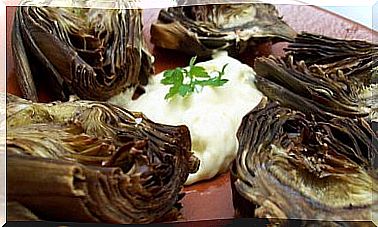Diet And Lupus, What Should I Eat And What Should I Avoid?
Nutrition plays a very important role in preventing, treating, and controlling disease. Therefore, if you suffer from lupus disease or know someone who has it, it is very important to know a series of guidelines that allow you to take care of your diet.
Anyway, even having not developed this disease, do not neglect your dietary habits. In this way you can reduce the incidence of this and many other complex diseases that can condition your lifestyle. Read on to find out what they are!
What is lupus?
Systemic lupus erythematosus is an autoimmune disease of unknown origin in which the body does not recognize infectious agents, therefore, it attacks itself. It presents with outbreaks that can be mild or severe depending on the person. It is a systemic disease, which means that it produces symptoms in different tissues of the human body.
In addition, it can be associated with diseases such as osteoporosis, kidney damage, diabetes, hypertension and cardiovascular disease, so it is highly recommended that the person diagnosed with lupus monitor their diet and make favorable changes in their habits that allow them to improve their quality of life and avoid contributing to the development of these collateral diseases.
How does diet affect lupus?
It should be known that some medications to treat this disease cause an increase in appetite that translates into weight gain. Glucocorticoids interfere with the absorption of calcium, zinc, potassium, vitamins B6, C and D, causing muscle loss and affecting the normal balance of blood sugar. As a consequence, there is an increase in fat deposits in the body.
Conversely, there may also be weight loss or decreased appetite and gastrointestinal discomforts such as heartburn, upset stomach, nausea, vomiting, or painful mouth ulcers.
To avoid protein losses, it is recommended to monitor protein intake. Ensuring the presence of these nutrients in the diet in adequate amounts reduces the risk of developing sarcopenia, according to research published in the journal Nutrition Research.
What do I have to eat on a lupus diet?

Vitamin D
Vitamin D participates in the regulation of calcium in the body, which is why it is responsible for maintaining strong bones and teeth. This vitamin is very important for people with lupus, since they should avoid exposure to the sun, therefore, they should consume it in their diet.
As a study published in Autoimmunity Highlights points out , vitamin D deficiency could have negative effects on the immune response of patients.
It is present in fortified milk, egg yolk, liver, oily fish, and fish liver oils. It is important to limit caffeine consumption to a maximum of 3 cups of coffee a day, or soda or caffeinated tea, as it decreases the absorption of vitamin D.
Folic acid
Methotrexate used in the treatment of lupus can cause folate deficiency, therefore folic acid supplementation is advised to protect against gastrointestinal disorders and maintain optimal red blood cell production.
In food, folic acid is found in green leafy vegetables, parsley, legumes, and nuts. Do not consume the supplement together with tea, as it prevents the absorption of the vitamin.
Calcium
As we’ve said before, people with lupus are at higher risk for osteoporosis, according to an article published in the Current Health Sciences Journal . This is because this disease is suffered mainly by women, and they usually do little physical activity due to the pain and fatigue of the disease. It can also occur due to vitamin D deficiency which, in turn, leads to a calcium deficit.
The foods with the highest concentration of calcium are dairy, green leafy vegetables, chickpeas, almonds, sardines, and vegetable seeds. It must also be taken into account that it should be consumed apart from coffee, alcohol and tobacco, as they hinder its absorption.
Omega-3 fatty acids
Consuming omega-3 fatty acids has an anti-inflammatory effect, in addition to the impact on the control of dyslipidemias; therefore, people with lupus should follow a diet high in this fatty acid, which is found in flaxseed oil, soybean oil, walnuts, and oily fish.
What should I avoid?

Sodium, diet, and lupus
Excess salt is associated with hypertension and increased excretion of calcium in the urine, which increases the risk of osteoporosis. Foods to avoid are:
- Stuffed meats.
- Ripe cheeses.
- Preserved food.
- Creams or soups of envelope.
- Industrial and soy sauces.
- Highly processed foods.
Calorie restriction
It is not advisable for people with lupus to follow strict diets, as the restriction of calories in the diet accelerates autoimmune diseases. The National Academy of Sciences recommends a diet of 1800-2000 kcal per day for sedentary people with lupus.
Alfalfa, diet and lupus
People with lupus should avoid alfalfa, as lupus flare-ups have been associated. These effects can include muscle pain, fatigue, abnormal blood test results, changes in how the immune system works, and kidney problems.
Watch your diet to manage lupus
Finally, it is essential to bear in mind that nutritional needs may vary in each patient, depending on their age and condition. Therefore, although these recommendations can be taken into account, it is best to consult with a healthcare professional.









